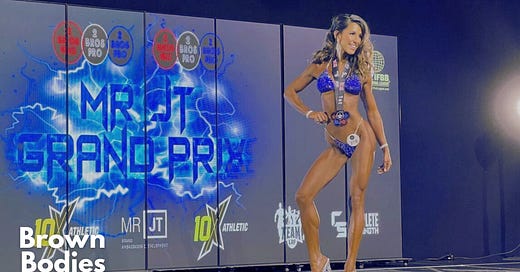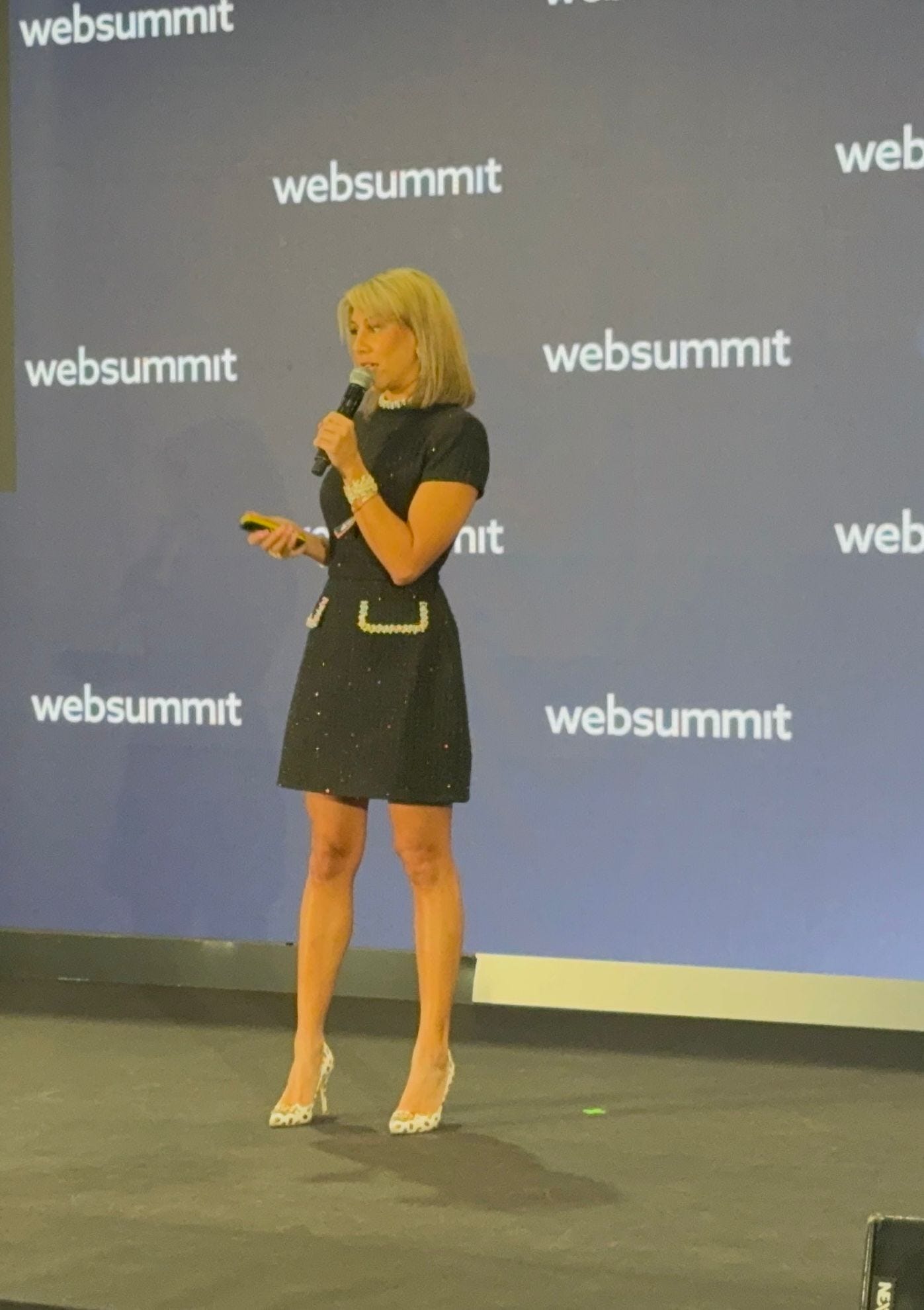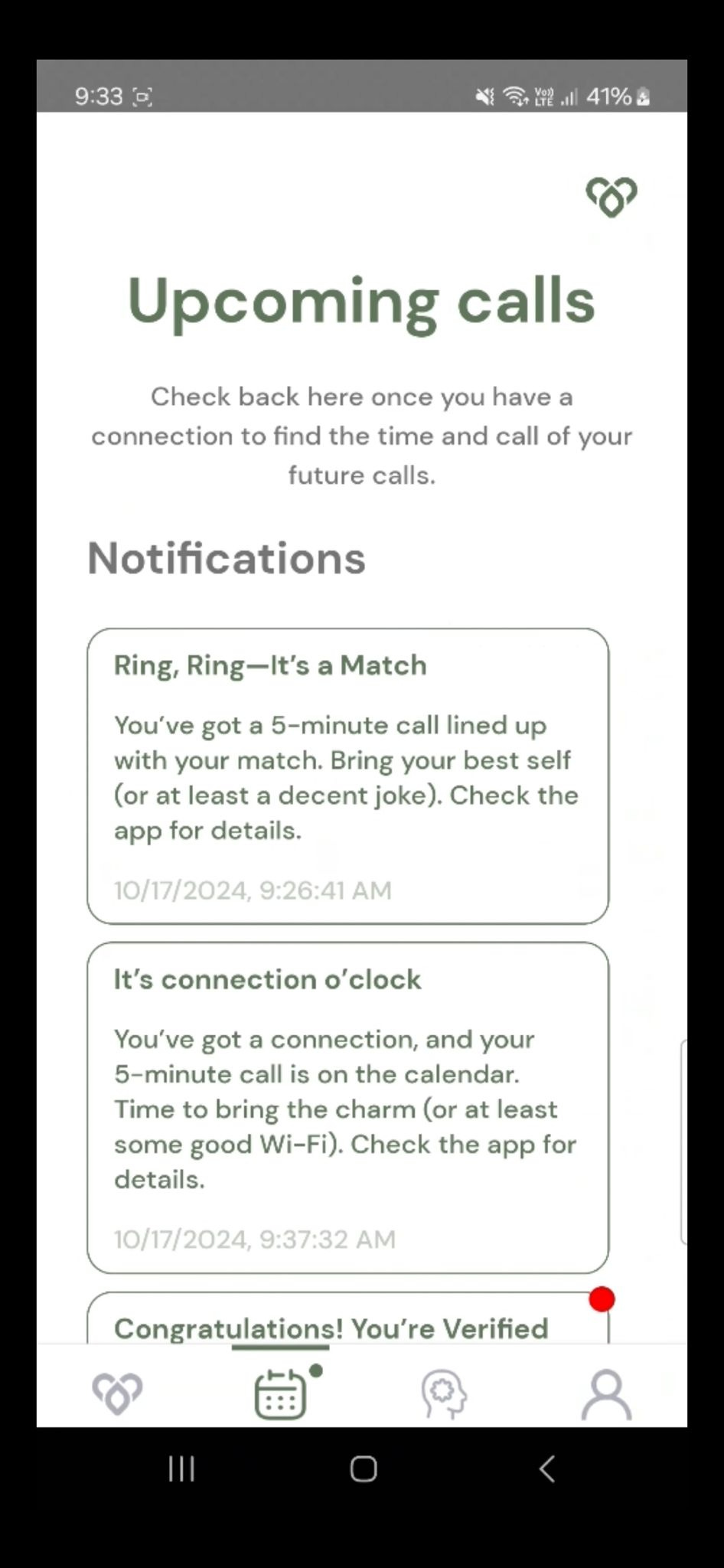I’m spending my weekend in Bristol with my lovely friends who’ve just bought a house up here. We’re doing Christmas market-y things and I’m forcing them to run with me, although I’m not sure they knew that last part when they invited me up! So, I’ve handed over this Brown Bodies issue to Zaahirah Adam to round up the last of this year’s dating apps series.
Ze and I met for the first time this week over smoothies and god awful chai at Granger & Co. (yes, we knew this was a bad ordering decision at the time) in Kings Cross. She’s the epitome of a founder — always doing too much! Aside from writing a book, competing at international level in lifting and having a full time job in strategy consulting, she’s now transitioning over to my side of the word: becoming a tech founder. Of course, we ended up barely talking about any of that (read: I should have been more helpful but got distracted) and spent our time discussing my favourite topics of love and sex and why the hell she’s decided to build a dating app in a market that already feels saturated.
Culture, faith and heritage play a significant role in my conversations with Brown Bodies but these pillars aren’t central to every brown body’s perspectives and experiences. It’s one of the reasons I was keen to have Ze’s voice this week.
Over to her.
What’s been my relationship with love to date?
Let’s just say, my relationship with love has been… complicated. I’m a hopeless romantic at heart. I’ve always dreamed of falling in love, getting married, and building a life with someone who feels like home. When I was younger, it felt inevitable. There was a certainty that one day I’d meet that someone who just fit. But as I’ve gotten older, that guarantee has started to feel, well… implausible. And, here’s something they don’t tell you when you’re younger: dating as a young, relatively attractive, and relatively successful woman is hard. I honestly think it's one of the hardest demographics to be in when it comes to dating. On paper, you’re the perfect catch: financially independent, a property owner, well-traveled, ambitious. But in practice? The pool of ‘compatible’ people shrinks, and navigating it feels like a minefield. Plus, you’re either ‘too much’ for some people or ‘too intimidating’ for others. You filter through profiles where their big selling point is “6’2’ if that matters”, while you’re looking for kindness, ambition, and emotional maturity. Add to that the casual daters who aren’t sure what they’re looking for at the ripe old age of 40 or the ones whose idea of romance is a Netflix binge. Suddenly, staying single forever doesn’t seem so bad.
And then there’s sex because, let’s face it, it always comes up in conversations about dating. For me, sex isn’t just a physical act. It’s a physical manifestation of an emotional connection. That’s probably why I don’t believe in the concept of ‘bad sex’. If there’s genuine chemistry and emotional depth, how could it ever be bad?
Sex, for me, is about trust, vulnerability, and exclusivity. Casual sex? Not my thing. Sure, as a bucket-list item, I checked out a sex club once to see what all the fuss was about. And while it was fascinating, it just didn’t click. The whole vibe felt transactional. For me, sex without emotion is like coffee without caffeine — what’s the point? I wouldn’t sleep with someone who’s still seeing other people and it’s not because of societal norms or rules but because that’s just how I’m wired.
Do I have dating stories?
Oh, where do I even start? The last date I went on was with a guy who, halfway through dinner, casually mentioned he’d broken up with his fiancée three months earlier and they might actually be getting back together but he wasn’t sure yet. Naturally, I asked why he’d even asked me out and he said, “Well, you’re beautiful and we had great chemistry when we bumped into each other the night before so I thought, ‘Why not?’” Yes folks, this is the dating pool we’re all swimming in.
Then there was the man who took misogyny to Olympic levels. When the menu arrived, he snatched it away because, “Women don’t get a say.” I asked the waitress to sneak me out the back door and, to her credit, she pulled off an escape plan worthy of a spy movie.
I had a phase where I would leave dates within 10 minutes if I knew it wasn’t going anywhere. One guy, upon realising he wasn’t getting a second drink out of me, let me know, “Maybe there’s no chemistry because you’re so full of yourself. Have you ever considered you’re the problem?” Lovely. Truly charming.
But not every date has been awful. Some have been magical ones filled with chemistry, laughter, and that rare spark of hope. Unfortunately, those magical dates often were with men who live on the other side of the planet. The spark was real but so was the logistical nightmare of trying to make long-distance work across time zones.
There, of course, have been the endless situationships and the almosts. The people who seemed perfect, until they weren’t or I wasn't. The ones who strung me along just enough to keep me interested but never enough to take things seriously. The ones who didn’t know what they wanted but were happy to waste my time figuring it out. Not all of these situationships were men’s fault. Sometimes, I was the problem. My insecurities got the better of me and I struggled to let things unfold naturally. The thing is, I’m super old school. I don’t really understand all these modern labels — dating, exclusively seeing each other, a relationship. For me, there’s only one gear: all in. I don’t like many people but, when I do, I jump in with both feet and don’t need a lot of time to decide. Sometimes, I jumped so fast that I didn’t give the other person time and space to catch up. My intensity scared people off or created a one-sided dynamic where I felt vulnerable and they felt overwhelmed.
Why did I look into matchmakers?
Then there’s the apps themselves. They’re not built for connection but for engagement. They’re designed to keep you swiping, liking, and chatting. Every match feels like a win until the person ghosts you, the conversation dies, or you realise you’ve sent the same ‘How’s your day?’ message for the hundredth time. I suck at texting. Trying to maintain endless conversations with strangers about their weekend plans feels less like dating and more like admin that drains the fun and the spark. Then there’s sex. Apps are built for surface-level connections and instant gratification — I’m looking for someone who makes me feel safe, seen, and cherished.
Some nights, I’d lie awake with this unbearable anxiety, wondering if I’d die alone. Was there something wrong with me? Why was I so unlovable? I started thinking about all the times I’d opened up a dating app and ended up feeling worse than before. It wasn’t just the bad matches or ghosting — it was the loneliness of it all. The system wasn’t helping me find love; it was making me feel like love was impossible.
In my frustration, I turned to the world of matchmakers: professionals who promise to take the stress out of dating, find the perfect person for you, and make the whole process seamless. It sounded great…
What does the matchmaking process actually entail?
I spoke to three or four of the leading matchmakers in the UK and the process is pretty similar across the board. It all starts with an introductory call where they try to understand what you’re looking for: your preferences, deal breakers and values. They explain a bit more about the process and the pricing (spoiler alert: it’s eye-watering).
If you’re willing to go ahead, you move on to a more in-depth session. This is usually a 60-90 minute coffee where they really dig into your personality, preferences and relationship history to get a clearer picture of what you’re looking for in a partner.
The matchmakers go away and create a shortlist of potential candidates of people who roughly fit what you’re looking for. They present this shortlist to you and, if you’re happy, they start arranging dates. Most contracts are six to twelve months long, with a guarantee of one date a month or one date every six weeks. Yes, you read that right — just one date every six weeks. Some of the higher-end matchmakers even take care of booking a restaurant for you. A nice touch, I suppose. After each date, both you and the person you dated give the matchmaker feedback which they use to refine their search for your next match.
It’s a process that sounds great in theory but here’s where they lost me: there’s no guarantee. Most matchmakers charge upwards of £15k and they don’t even guarantee you’ll find a partner. Imagine spending the equivalent of a car or a house deposit, only to hear, “We’ll introduce you to some people, but we can’t promise anything.” I was offskie. That lack of clarity and accountability was the deal-breaker. If I was going to spend that kind of money, I wanted real results or, at least, a clear path to them. If someone had said, “Hey, pay us £100k and we’ll work with you until you’re in a happy, committed relationship,” I would’ve handed over my savings and remortgaged my flat in a heartbeat.
The only good thing that came out of looking into matchmakers was that it forced me to get really clear on what I wanted. I even wrote it all down in a note on my phone! I really suggest you do the same.
What did I think I wanted and how do culture and faith play into it?
Culture and faith are deeply complex for me, especially as a first-generation immigrant. My parents are Mauritian but I am British, and that dual identity has been both a defining and challenging theme of my life.
People often ask me, “Where are you really from?” because of the colour of my skin. But to me, I’m British through and through. I’m from here, always have been, always will be. But, growing up, my parents made it abundantly clear that I didn’t truly belong here. Despite being born in the UK, it wasn’t my place, they said. And yet Mauritius — which many would call a paradise — felt like hell to me. I felt like an outsider there. I didn’t think or sound like my cousins. My idea of fun was dancing on a table in the South of France and theirs was taking on an extra school module. Straddling those two worlds was tough and it created a sense of disconnection, a sense of not fully belonging anywhere.
This dissonance has shaped how I approach dating and relationships. Despite being hereditary Asian, I don’t identify as Asian in the way most might assume. I’m not close to my family so their background and history have little bearing on who I am. If anything, it’s made me certain of what I don’t want: rigidity, judgment, or narrow-mindedness.
I’ve dated people of all faiths and cultures. For me, the key isn’t about a shared heritage or religion but about openness. To me, dating is synonymous with building a future, getting married, and starting a family. For that, what truly matters is intellectual and emotional flexibility. I want a partner who can accept me for who I am today, who will grow with me tomorrow, and who will embrace our children no matter what culture or faith they choose to identify with in the future. It’s about finding someone who values love and connection over labels. Someone who understands that identity isn’t a fixed thing — it’s a fluid, evolving journey.
Why I said ‘Fuck it’ and decided to build an app.
I’ve always had a clear plan for my career. I work in banking and I’m damn good at it. I was going to climb the ladder and eventually run a FTSE 250 company. I never wanted to be an entrepreneur.
But the loneliness, the broken dating system, the way dating apps make me feel like love is out of reach all felt too big to ignore. I couldn’t stop thinking about it. I couldn’t stop feeling it.
So, I said, ‘Fuck it, if no one else is going to fix it, I will’. Instead of £15k on matchmakers, I’d plough my savings into Hati. My rebellion against everything that’s broken about modern dating. I’m building Hati because I’m sick of crying about being single and can’t stand the thought of spending another sleepless night wondering if I’ll ever find love. I’m building it because I know I’m not the only one feeling this way.
I didn’t want endless swiping, shallow texts, nor ghosting. I learnt that you can tell more about someone from their voice in five minutes than you can from weeks of texting. So, Hati’s unique selling point is that every match starts with a 5-minute voice call — a real, human conversation. After every call or date, we ask a simple question: “Do you want to continue?” There’s no ambiguity. No escape from the hard conversations. If the answer is no, we respectfully unmatch the pair and notify the other person.
This is 100% for intentional daters: people who know what they want: a long-term, meaningful relationship. If you’re not looking for that, Hati isn’t for you. Hati isn’t for everyone, and we’re unapologetic about that. I believe we can use technology to encourage honesty and respect. That tech can be used for good by bringing humanity back to dating. The hopeless romantic’s mission.
Does Hati consider culture or faith in its filtering process?
One of the greatest lessons I’ve learned in life is that everyone is different. What we value, what we prioritise, and what we look for in a partner are deeply personal choices. For some, culture and faith are absolutely foundational; for others, they’re less significant. We’re designing Hati so people can filter based on what’s important to them whether it’s shared religious beliefs, future family plans, shared values, or even a love of similar activities. It isn’t about telling people what should matter — it’s about creating a space where they can define it for themselves.
Do we have it 100% right at this very moment? Absolutely not. But we’re constantly listening and iterating.
So, here’s to the romantics. The ones who are still searching, still believing, and still refusing to settle. Together we can find love, actually. I just know it.
Thanks to Ze for this week’s takeover!








This feels so honest. I'm rooting for you in love and business. Good luck x